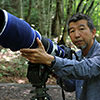EOS-1D X Mark II Live Action Review Part 1: Stunning Focus Accuracy and AF Tracking Performance
The new and improved EOS-1D X Mark II boasts several advances in shooting technology. How does it fare in terms of AF tracking capability, particularly sought after in professional cameras? Follow me as I put it to a field test, and find out more in this series of articles as I share my first impressions as a professional photographer. In Part 1, I’ll be sharing about the camera’s continuous shooting and AF tracking performance. (Reported by: Gaku Tozuka)

The EOS-1D X Mark II has a 1000mm equivalent focal length that recognises the faces of wild birds
“So this is how far we’ve come….”
These were my honest thoughts after testing out the EOS-1D X Mark II.
I was requested by the Editorial Department to visit the Akan International Crane Centre to photograph some cranes and white-tailed eagles. The place was chosen because they thought it would allow me to fully demonstrate the capabilities of this camera. With my motto to shoot in extreme conditions as much as possible, I fitted a 2x extender on the EF500mm f/4L IS II USM, and shot with a 1000mm focal length.

The EOS-1D X Mark II is the flagship of the EOS DSLR line. I put the camera to a field test in the harsh, frozen conditions of midwinter Hokkaido.

Capture faraway cranes and white-tailed eagles with the professional EF500mm f/4L IS II USM super-telephoto lens. Imagine the possibilities when used together with the EOS-1D X Mark II.

The Extender EF 2x III lets you use the EF lens at double the equivalent focal length. Though this means that the maximum aperture f-number is doubled, the EOS-1D X Mark II also offers up to 61 AF points (including 21 cross-type points) that can focus with an f/8 light flux so you won’t have to worry when shooting with AF.
Even with an f/8 light flux, the EOS-1D X Mark II offers up to 21 cross-type points, and also supports Zone AF and Auto Selection AF of up to 61 points. In general, when you mount an extender, the higher the level of magnification, the more difficult it is to place your subject in the viewfinder so shoot by hand as much as possible to so that you can respond to any sudden movements.
You’ll find results that are nothing short of amazing.
You not only have to keep sharp focus, but also follow the moving subject. Even with a 2x extender mounted, you must ensure that the subject is continually in focus while keeping up with any sudden movements and change in speed.
When using the Large Zone AF on predecessor models with subjects that are up close, there was a high chance that focus would slip to the tip of the crane's wings in such scenes. However, on the EOS-1D X Mark II, improvements to the subject tracking function of the EOS iTR AF allow you to keep focus on the face of a crane that is flying off, and maintain focus even as you track it.
EF500mm f/4L IS II USM+EXTENDER EF2× III/ FL: 1,000mm/ Manual Exposure (f/11, 1/3,200 sec)/ ISO 1600/ WB: Auto/Large Zone AF
Astounding AF performance that defies extreme shooting conditions
A peculiarity of recent cameras is that they react to heat haze when the AF accuracy is increased. However, when shooting with high-speed burst, you will definitely be able to capture shots that are not impacted by heat haze. When I saw the shots, I was astonished by the sharpness of the images. I was probably able to achieve this thanks to the combined capabilities of the Dual DIGIC 6+ imaging processor, the improved subject tracking abilities of the much-acclaimed new EOS iTR AF, as well as the AI Servo AF III.
On this camera, high-speed burst shooting is possible up to 14 shots per second. When I used a CFast 2.0-compatible card, there was no “busy” status, even when simultaneously recording my shots in RAW+JPEG (Large/Fine). With this, you could say that the photographer has been completely freed from the stresses that are normally associated with continuous shooting.

Born in 1966 in Aichi, Tozuka developed an interest in photography when he was in the third year of high school, and started to capture natural landscapes as well as wildlife animals. At the age of 20, he became absorbed in photographing wild birds after accidentally capturing a woodpecker in his photo. He has released a large number of works in media such as magazines, bulletins, books, calendars and TV commercials.
http://happybirdsday.jp/
A monthly magazine that believes that enjoyment of photography will increase the more one learns about camera functions. It delivers news on the latest cameras and features and regularly introduces various photography techniques.
Published by Impress Corporation

































